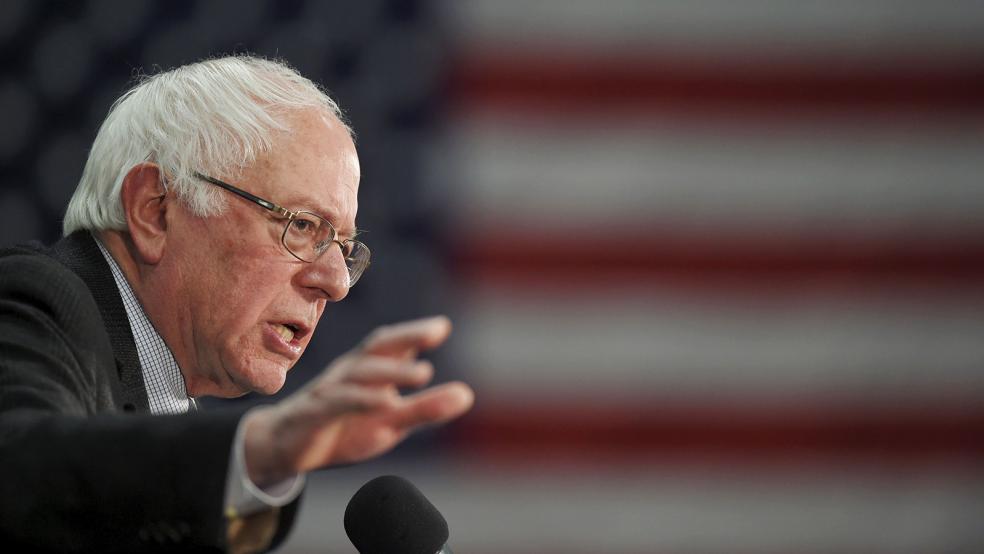Sen. Bernie Sanders of Vermont didn’t mince his words during last Monday night’s Democratic town hall in Iowa when he promised, “We will raise taxes, yes we will” to pay for the cornucopia of domestic programs he’s promised, including “Medicare for all” and tuition free college.
Without spelling out the details of his scheme for financing a revolutionary expansion of government services and programs, Sanders only half-heartedly disputed CNN moderator Chris Cuomo’s suggestion that the chief rival to Hillary Clinton for the Democratic presidential nomination was asking for “one of the biggest tax hikes in history.”
Related: Bernie Sanders: ‘We Will Raise Taxes. Yes, We Will’
A new analysis of the democratic socialist’s tax proposal by the non-partisan Tax Foundation suggests that it would, indeed, be record-breaking. It would also make good on Sanders’ promise to target wealthy Americans, including Wall Street executives and the “billionaire class,” for steep hikes in their tax rates.
Sanders’ plan would raise tax revenue by $13.6 trillion over the coming decade using the most conservative estimates, according to the Tax Foundation’s report. However, because Sanders’ fiscal policies likely would set back the economy in the coming year, his tax proposals would ultimately collect only $9.8 trillion over the next ten years.
By comparison, the January 2013 “fiscal cliff” budget deal between President Obama and congressional Republicans that is considered one of the largest tax hikes in modern times was designed to raise only $1.6 trillion over ten years.
Sanders’ tax plan for underwriting the cost of trillions of dollars in new programs and health care services include boosting the top marginal income tax rates to 54.2 percent, taxing capital gains and dividends as ordinary income, increasing payroll taxes to expand Social Security benefits, and capturing tax revenues of U.S. capital being sheltered overseas.
Related: The Next few Weeks Could Determine the Election—Here Are the Key Events
The vast majority of the fresh revenue being sought by Sanders would come from a new 6.2 percent payroll tax picked up by employers, a new 2 percent income tax on all households for health care, and the elimination of tax breaks for employers providing health care coverage to their employees.
Sanders has eclipsed Clinton in his calls for a massive buildup of government programs and a “soak the rich” plan for revising the federal tax code. Some estimates have pegged the total cost of Sanders’s social programs – including replacing Obamacare with a universal government health care plan similar to those in Canada and Europe – at $18 trillion over the coming decade.
“I believe everyone should be entitled to health care as a right,” Sanders said in response to a question from the audience during the nationally televised townhall meeting, claiming that his plan would “save middle class people thousands of dollars a year on their health care bills.”
The Vermont senator argued that it was unfair to criticize his proposed tax increases because millions of Americans would eventually see their higher taxes offset by elimination of the premiums on their current private health insurance policies.
Related: Study Challenges Clinton’s Tax Plan for $1 Trillion in New Spending
“If you are paying $10,000 a year to a private health insurance company, and I say to you, hypothetically, that you are going to pay $5,000 more a year in taxes…but you’re not going to pay any more private health insurance, are you going to be complaining about the fact that I’ve saved you $5,000 in your total bills?”
Sanders, who is currently running head to head with Clinton in Iowa and leading her in New Hampshire, has vowed to address a massive income inequality between the middle class and the top one percent of taxpayers in the country by forcing the rich to pay for a large part of his liberal agenda.
According to the Tax Foundation, Sanders’ plan would significantly increase marginal tax rates and the cost of capital, which in turn would lead to 9.5 percent lower Gross Domestic Product in the long term.
On a “static” or conservative basis, Sanders’ tax increases would effectively reduce all Americans’ after-tax income by 10.56 percent and by 17.91 percent for the top 1 percent of taxpayers. “When accounting for reduced GDP, after-tax incomes of all taxpayers would fall by at least 12.84 percent,” according to the report.
Clinton, meanwhile, proposed that roughly $1 trillion of new spending that would be paid for with tax increases, largely on wealthy Americans and investors. Her plan would increase federal tax revenues by $498 billion over the coming decade on a static basis, according to the Tax Foundation.
Related: Clinton’s Campaign Promises Total Nearly $1 Trillion – With More to Come
As for the distributional effects of Clinton’s tax increases, the after-tax income of the wealthiest top 10 percent of the country would see their after-tax income drop by 0.7 percent while the wealthiest one percent would lose 1.7 percent of their after-tax income.





